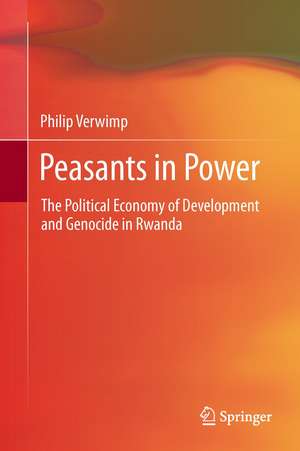Peasants in Power: The Political Economy of Development and Genocide in Rwanda
Autor Philip Verwimpen Limba Engleză Hardback – 17 iun 2013
Why did tens of thousands of ordinary people massacred tens of thousands other ordinary people in Rwanda in 1994? What has agricultural policy and rural ideology to do with it? What was the role of the Akazu, the presidential clan around president Habyarimana? Did the civil war cause the genocide? And what insights can a political economy perspective offer ?
Based on more than ten years of research, and engaging with competing and complementary arguments of authors such as Peter Uvin, Alison Des Forges, Scott Strauss, René Lemarchand, Filip Reyntjens, Mahmood Mamdani and André Guichaoua, the author blends economics, politics and agrarian studies to provide a new way of understanding the nexus between development and genocide in Rwanda. Students and practitioners of development as well as everyone interested in the causes of violent conflict and genocide in Africa and around the world will find this book compelling toread.
.
| Toate formatele și edițiile | Preț | Express |
|---|---|---|
| Paperback (1) | 640.55 lei 6-8 săpt. | |
| SPRINGER NETHERLANDS – 15 iul 2015 | 640.55 lei 6-8 săpt. | |
| Hardback (1) | 646.75 lei 6-8 săpt. | |
| SPRINGER NETHERLANDS – 17 iun 2013 | 646.75 lei 6-8 săpt. |
Preț: 646.75 lei
Preț vechi: 760.88 lei
-15% Nou
Puncte Express: 970
Preț estimativ în valută:
123.77€ • 127.86$ • 103.01£
123.77€ • 127.86$ • 103.01£
Carte tipărită la comandă
Livrare economică 25 martie-08 aprilie
Preluare comenzi: 021 569.72.76
Specificații
ISBN-13: 9789400764330
ISBN-10: 9400764332
Pagini: 296
Ilustrații: XIX, 276 p. 24 illus.
Dimensiuni: 155 x 235 x 22 mm
Greutate: 0.59 kg
Ediția:2013
Editura: SPRINGER NETHERLANDS
Colecția Springer
Locul publicării:Dordrecht, Netherlands
ISBN-10: 9400764332
Pagini: 296
Ilustrații: XIX, 276 p. 24 illus.
Dimensiuni: 155 x 235 x 22 mm
Greutate: 0.59 kg
Ediția:2013
Editura: SPRINGER NETHERLANDS
Colecția Springer
Locul publicării:Dordrecht, Netherlands
Public țintă
ResearchCuprins
Chapter 1. Introductory Chapter: Development, Dictatorship and Genocide.- Chapter 2. The Nature of the Second Republic.- Chapter 3. The Rwandan Economy 1973-1994: From Macro to Micro.- Chapter 4. The Political Economy of Coffee and Dictatorship.- Chapter 5. Crop Failure and Famine in Southern Rwanda.- Chapter 6. The 1990-92 Massacres: A Case of Spatial and Social Engeneering?.- Chapter 7. Civil War, Multipartism, Coup d’Etat and Genocide.- Chapter 8. Collective Action, Norms and Peasant Participation in Genocide.- Chapter 9. Fieldwork in Gitarama: Introduction, Setting and Methods; Co-authored by Jacob Boersema and Philip Verwimp.- Chapter 10. The Developmental State at Work: Agricultural Monitors becoming Political Entrepreneurs; Co-authored by Jacob Boersema, Arlette Brone, Jerome Charlier, Bert Ingelaere, Shanley Pinchotti, Inge Thiry, Cecelle Meijer, Marij Spiesschaert and Philip Verwimp.- Chapter 11. Concluding Chapter: The Endogenous Genocide.
Notă biografică
Philip Verwimp is Associate Professor of Development Economics at the Solvay Brussels School of Economics and Management, Université Libre de Bruxelles, where he holds the Marie and Alain Philippson Chair in Sustainable Human Development. He is Fellow of ECARES, member of the Centre Emile Bernheim and co-founder and co-director of the Households in Conflict Network. He is author and co-author of articles published in the American Economic Review, the Journal of Development Economics, Economic Development and Cultural Change, the Journal of Agrarian Studies, the Journal of Conflict Resolution and the Journal of Peace Research, among others.
Textul de pe ultima copertă
This book shows how Rwanda’s development model and the organisation of genocide are two sides of the same coin. In the absence of mineral resources, the elite organised and managed the labour of peasant producers as efficient as possible. In order to stay in power and benefit from it, the presidential clan chose a development model that would not change the political status quo. When the latter was threatened, the elite invoked the preservation of group welfare of the Hutu, called for Hutu unity and solidarity and relied on the great mass (rubanda nyamwinshi) for the execution of the genocide. A strategy as simple as it is horrific. The genocide can be regarded as the ultimate act of self-preservation through annihilation under the veil of self-defense.
Why did tens of thousands of ordinary people massacred tens of thousands other ordinary people in Rwanda in 1994? What has agricultural policy and rural ideology to do with it? What was the role of the Akazu, the presidential clan around president Habyarimana? Did the civil war cause the genocide? And what insights can a political economy perspective offer ?
Based on more than ten years of research, and engaging with competing and complementary arguments of authors such as Peter Uvin, Alison Des Forges, Scott Strauss, René Lemarchand, Filip Reyntjens, Mahmood Mamdani and André Guichaoua, the author blends economics, politics and agrarian studies to provide a new way of understanding the nexus between development and genocide in Rwanda. Students and practitioners of development as well as everyone interested in the causes of violent conflict and genocide in Africa and around the world will find this book compelling to read.
Why did tens of thousands of ordinary people massacred tens of thousands other ordinary people in Rwanda in 1994? What has agricultural policy and rural ideology to do with it? What was the role of the Akazu, the presidential clan around president Habyarimana? Did the civil war cause the genocide? And what insights can a political economy perspective offer ?
Based on more than ten years of research, and engaging with competing and complementary arguments of authors such as Peter Uvin, Alison Des Forges, Scott Strauss, René Lemarchand, Filip Reyntjens, Mahmood Mamdani and André Guichaoua, the author blends economics, politics and agrarian studies to provide a new way of understanding the nexus between development and genocide in Rwanda. Students and practitioners of development as well as everyone interested in the causes of violent conflict and genocide in Africa and around the world will find this book compelling to read.
Caracteristici
Offers a distinctive perspective on the origins of the Rwandan genocide Provides a new way of understanding the nexus between development and genocide in Rwanda.




